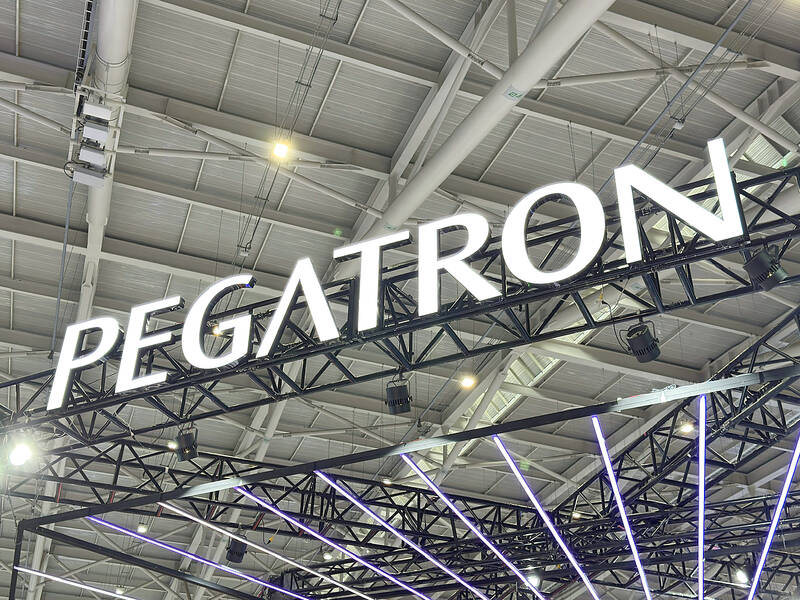Pegatron Corp (和碩), one of Apple Inc’s iPhone assemblers, is to spend US$85 million to establish a new US subsidiary to meet customer demand for made-in-US products, after its board approved the plans on Friday.
The subsidiary would add new production capacity for servers and any products that customers request be made in the US to avoid potential tariffs, a Pegatron official told the Taipei Times by telephone yesterday.
US President Donald Trump on April 2 announced “reciprocal” tariffs for Taiwan and many other countries, which were later paused for 90 days.

Photo: Huang Wei-chieh, Taipei Times
The decision, announced on Friday in a regulatory filing, is part of Pegatron’s global expansion strategy, with the subsidiary expected to become one of its production bases, said the official, who declined to be named.
The company in March told an online earnings call that it planned to build a new server manufacturing facility in the US.
That would be the company’s second server production base in addition to its facilities in Taoyuan.
Regarding the location of the US subsidiary, Pegatron is weighing factors such as electricity costs, transportation and labor before making a final decision, co-CEO Gary Cheng (鄭光志) told reporters after the company’s shareholders’ meeting earlier this month.
The site would “likely be somewhere many of our peers have already set up factories,” Cheng said, responding to a question about whether it would build in Texas.
Aside from Pegatron, several Taiwanese electronics manufacturers, including Hon Hai Precision Industry Co (鴻海精密), Inventec Corp (英業達) and Wistron Corp (緯創), have announced plans to expand production capacity in the US to mitigate the potential impacts of tariff, with Texas emerging as the most popular location.
Inventec approved an investment of up to US$85 million in April to build a manufacturing base in Texas to support its artificial intelligence (AI) server shipments, while Wistron last month announced plans to spend up to US$50 million to acquire land and facilities in Dallas, Texas, for its high-performance computing devices.
Hon Hai has invested US$142 million in Houston, Texas, to expand its AI server capacity, it said in March.

Taiwan’s foreign exchange reserves hit a record high at the end of last month, surpassing the US$600 billion mark for the first time, the central bank said yesterday. Last month, the country’s foreign exchange reserves rose US$5.51 billion from a month earlier to reach US$602.94 billion due to an increase in returns from the central bank’s portfolio management, the movement of other foreign currencies in the portfolio against the US dollar and the bank’s efforts to smooth the volatility of the New Taiwan dollar. Department of Foreign Exchange Director-General Eugene Tsai (蔡炯民)said a rate cut cycle launched by the US Federal Reserve

Handset camera lens maker Largan Precision Co (大立光) on Sunday reported a 6.71 percent year-on-year decline in revenue for the third quarter, despite revenue last month hitting the highest level in 11 months. Third-quarter revenue was NT$17.68 billion (US$581.2 million), compared with NT$18.95 billion a year earlier, the company said in a statement. The figure was in line with Yuanta Securities Investment Consulting Co’s (元大投顧) forecast of NT$17.9 billion, but missed the market consensus estimate of NT$18.97 billion. The third-quarter revenue was a 51.44 percent increase from NT$11.67 billion in the second quarter, as the quarter is usually the peak

Nvidia Corp’s major server production partner Hon Hai Precision Industry Co (鴻海精密) reported 10.99 percent year-on-year growth in quarterly sales, signaling healthy demand for artificial intelligence (AI) infrastructure. Revenue totaled NT$2.06 trillion (US$67.72 billion) in the last quarter, in line with analysts’ projections, a company statement said. On a quarterly basis, revenue was up 14.47 percent. Hon Hai’s businesses cover four primary product segments: cloud and networking, smart consumer electronics, computing, and components and other products. Last quarter, “cloud and networking products delivered strong growth, components and other products demonstrated significant growth, while smart consumer electronics and computing products slightly declined,” compared with the

The US government on Wednesday sanctioned more than two dozen companies in China, Turkey and the United Arab Emirates, including offshoots of a US chip firm, accusing the businesses of providing illicit support to Iran’s military or proxies. The US Department of Commerce included two subsidiaries of US-based chip distributor Arrow Electronics Inc (艾睿電子) on its so-called entity list published on the federal register for facilitating purchases by Iran’s proxies of US tech. Arrow spokesman John Hourigan said that the subsidiaries have been operating in full compliance with US export control regulations and his company is discussing with the US Bureau of